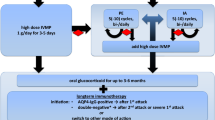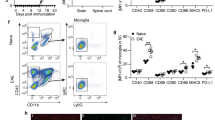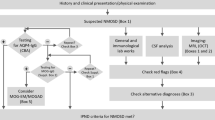Abstract
Background/Aim
Disease-modifying therapy (DMT) has led to added challenges in the management of people with multiple sclerosis (pwMS) during the COVID-19 era. It can reduce relapse in MS or slow down disease progression, but some DMTs can increased risk of infection. The aim of study was to evaluate risk and severity of COVID-19 in pwMS.
Methods
The examined group of pwMS were divided in group treated with IFN-β1a, group treated with ocrelizumab and untreated group. The examination included impact of age, gender, duration of MS, type of MS, vaccination status and Expanded Disability Status Scale (EDSS) on the risk and severity of COVID-19 infection. A diagnosis of COVID-19 in pwMS was confirmed by positive polymerase-chain-reaction (PCR) or antigen test.
Results
Out of 207 pwMS, 82 patients were treated with ocrelizumab, 63 with IFN-β1a, while 62 patients were untreated pwMS. The average duration of the MS was longer in the group of patients treated with ocrelizumab than in the group treated with IFN-β1a (p < 0.05). EDSS was higher in the ocrelizumab group compared to the other two groups (p < 0.001). Untreated (more often unvaccinated) had the same COVID frequency as ocrelizumab-treated (more vaccinated, but higher EDSS). The multivariate logistic regression model indicated that administration of IFN-β1a reduces the risk of COVID-19 infection (p = 0.001, OR = 0.381, 95% CI 0.602–0.160). The use of both DMTs, driven mainly by the IFN-β1a effect, reduces the risk of moderate and severe COVID-19 (p < 0.05, OR = 0.105, 95% CI 0.011–0.968).
Conclusion
This study provides evidence that IFN-β1a can reduce the frequency of COVID-19 infection and that two DMTs, driven mainly by the IFN-β1a effect, do not increase the risk of moderate/severe COVID-19.
Similar content being viewed by others
References
Howard J, Trevick S, Younger DS (2016) Epidemiology of multiple sclerosis. NeurolClin 34(4):919–939. https://doi.org/10.1016/j.ncl.2016.06.016
MSIF (2020) Atlas of MS 2020: Mapping multiple sclerosis around the world. Key Epidemiology Findings. Multiple Sclerosis International Federation
Tafti D, Ehsan M, Xixis KL (2022) Multiple sclerosis. In: StatPearls [Internet]. Treasure Island (FL). Available from: https://www.ncbi.nlm.nih.gov/books/NBK499849/
Rotstein DL, Healy BC, Malik MT et al (2015) Evaluation of no evidence of disease activity in a 7-year longitudinal multiple sclerosis cohort. JAMA Neurol 72:152–158
Jacobs JJL (2020) Neutralizing antibodies mediate virus-immune pathology of COVID-19. Med Hypotheses 143:109884
Filipi M, Jack S (2019) Interferons in the treatment of multiple sclerosis: a clinical efficacy, safety, and tolerability update. Int J MS Care 22(4):165–172. https://doi.org/10.7224/1537-2073.2018-063
Frieman M, Yount B, Heise M, Kopecky-Bromberg SA, Palese P, Baric RS (2017) Severe acute respiratory syndrome coronavirus ORF6 antagonizes STAT1 function by sequestering nuclear import factors on the rough endoplasmic reticulum/Golgi membrane. J Virol 81(18):9812–9824. https://doi.org/10.1128/JVI.01012-07
Hauser SL, Bar-Or A, Comi G, Giovannoni G, Hartung HP, Hemmer B, Lublin F, Montalban X, Rammohan KW, Selmaj K, Traboulsee A, Wolinsky JS, Arnold DL, Klingelschmitt G, Masterman D, Fontoura P, Belachew S, Chin P, Mairon N, Garren H, Kappos L (2017) OPERA I and OPERA II clinical investigators. ocrelizumab versus interferon beta-1a in relapsing multiple sclerosis. N Engl J Med 376(3):221–234. https://doi.org/10.1056/NEJMoa1601277
Hughes R, Whitley L, Fitovski K, Schneble HM, Muros E, Sauter A, Craveiro L, Dillon P, Bonati U, Jessop N, Pedotti R, Koendgen H (2021) COVID-19 in ocrelizumab-treated people with multiple sclerosis. Mult Scler Relat Disord 49:102725. https://doi.org/10.1016/j.msard.2020.102725
Simpson-Yap S, De Brouwer E, Kalincik T et al (2021) Associations of disease-modifying therapies with COVID-19 severity in multiple sclerosis. Neurology 97(19):e1870–e1885. https://doi.org/10.1212/WNL.0000000000012753
Cucinotta D, Vanelli M (2020) WHO declares COVID-19 a pandemic. Acta Biomed 91(1):157–160. https://doi.org/10.23750/abm.v91i1.9397.PMID:32191675;PMCID:PMC7569573
Chan JF, Yuan S, Kok KH, To KK, Chu H, Yang J, Xing F, Liu J, Yip CC, Poon RW, Tsoi HW, Lo SK, Chan KH, Poon VK, Chan WM, Ip JD, Cai JP, Cheng VC, Chen H, Hui CK, Yuen KY (2020) A familial cluster of pneumonia associated with the 2019 novel coronavirus indicating person-to-person transmission: a study of a family cluster. Lancet 395(10223):514–523
Weiss P, Murdoch DR (2020) Clinical course and mortality risk of severe COVID-19. Lancet 395(10229):1014–1015
Xu PP, Tian RH, Luo S et al (2020) Risk factors for adverse clinical outcomes with COVID-19 in China: a multicenter, retrospective, observational study. Theranostics 10:6372–6383
Lupu D, Tiganasu R (2022) COVID-19 and the efficiency of health systems in Europe. Health Econ Rev 12:14. https://doi.org/10.1186/s13561-022-00358-y
Wijnands JM, Kingwell E, Zhu F, Zhao Y, Fisk JD, Evans C, Marrie RA (2017) Infection-related health care utilization among people with and without multiple sclerosis. Mult Scler 23(11):1506–1516. https://doi.org/10.1177/1352458516681198
Steelman AJ (2015) Infection as an environmental trigger of multiple sclerosis disease exacerbation. Front Immunol 6:520. https://doi.org/10.3389/fimmu.2015.00520
Iaffaldano P, Lucisano G, Manni A, Paolicelli D, Patti F, Capobianco M, Brescia Morra V, Sola P, Pesci I, Lus G, De Luca G, Lugaresi A, Cavalla P, Montepietra S, Maniscalco GT, Granella F, Ragonese P, Vianello M, Brambilla L, Totaro R, Toscano S, Malucchi S, Petracca M, Moiola L, Ferraro D, Lepore V, Mosconi P, Ponzio M, Tedeschi G, Comi G, Battaglia MA, Filippi M, Amato MP, Trojano M (2022) Italian MS Register. Risk of getting COVID-19 in people with multiple sclerosis: a case–control study. Neurol Neuroimmunol Neuroinflamm 9(2):e1141. https://doi.org/10.1212/NXI.0000000000001141
Mallucci G, Zito A, Baldanti F et al (2021) Safety of disease-modifying treatments in SARS-CoV-2 antibody-positive multiple sclerosis patients. MultSclerRelatDisord 49:102754
Fernandes PM, O’Neill M, Kearns PKA et al (2020) Impact of the first COVID-19 pandemic wave on the Scottish Multiple Sclerosis Register population. Wellcome Open Res 5:276
Costabile T, Carotenuto A, Lavorgna L, Borriello G, Moiola L, Inglese M, Petruzzo M, Trojsi F, Ianniello A, Nozzolillo A, Cellerino M, Boffa G, Rosa L, Servillo G, Moccia M, Bonavita S, Filippi M, Lanzillo R, Brescia Morra V, Petracca M (2020) COVID-19 pandemic and mental distress in multiple sclerosis: Implications for clinical management. Eur J Neurol. 28(10):3375–3383. https://doi.org/10.1111/ene.14580
Australian National COVID-19 Clinical Evidence Taskforce. Australian guidelines for the clinical care of people with COVID-19, Version 16. Australian National COVID-19 Clinical Evidence Taskforce; 2020 [cited 2020 August 2]. Available from https://covid19evidence.net.au/
Federation MSI (2022) MS, the coronavirus and vaccines—updated global advice. 2021 [cited 2022 Feb 8 2022]. Available from https://www.msif.org/news/2020/02/10/the-coronavirus-and-ms-what-you-nee
Moss BP, Mahajan KR, Bermel RA, Hellisz K, Hua LH, Hudec T, Husak S, McGinley MP, Ontaneda D, Wang Z, Weber M, Tagliani P, Cárdenas-Robledo S, Zabalza A, Arrambide G, Carbonell-Mirabent P, Rodríguez-Barranco M, Sastre-Garriga J, Tintore M, Montalban X, Douglas M, Ogbuokiri E, Aravidis B, Cohen JA, Mowry EM, Fitzgerald KC. (2020) Multiple sclerosis management during the COVID-19 pandemic. Mult Scler. 26(10):1163–1171. https://doi.org/10.1177/1352458520948231
Berger JR, Brandstadter R, Bar-Or A (2020) (2020) COVID-19 and MS disease-modifying therapies. Neurol Neuroimmunol Neuroinflamm 7(4):e761. https://doi.org/10.1212/NXI.0000000000000761
Monk PD, Marsden RJ, Tear VJ, Brookes J, Batten TN, Mankowski M, Gabbay FJ, Davies DE, Holgate ST, Ho LP, Clark T, Djukanovic R, Wilkinson TMA (2021) Inhaled Interferon Beta COVID-19 Study Group. Safety and efficacy of inhaled nebulised interferon beta-1a (SNG001) for treatment of SARS-CoV-2 infection: a randomised, double-blind, placebo-controlled, phase 2 trial. Lancet Respir Med 9(2):196–206. https://doi.org/10.1016/S2213-2600(20)30511-7
Freedman MS, Jack D, Murgasova Z, Todorovic M, Seitzinger A (2021) Outcomes of COVID-19 among patients treated with subcutaneous interferon beta-1a for multiple sclerosis. MultSclerRelatDisord 56:103283. https://doi.org/10.1016/j.msard.2021.103283
Salter A, Fox RJ, Newsome SD, Halper J, Li DKB, Kanellis P, Costello K, Bebo B, Rammohan K, Cutter GR, Cross AH (2021) Outcomes and risk factors associated with SARS-CoV-2 infection in a North American registry of patients with multiple sclerosis. JAMA Neurol 78(6):699–708. https://doi.org/10.1001/jamaneurol.2021.0688
Sosa JP, Ferreira Caceres MM, Ross Comptis J, Quiros J, Príncipe-Meneses FS, Riva-Moscoso A, Belizaire MP, Malanyaon FQ, Agadi K, Jaffery SS, Sahajwani J, Arshia A, Senatus A, Verdecia G, Akano L, Razzack AA, Salam S, Gadamidi VK, Marian S (2021) Effects of interferon beta in COVID-19 adult patients: systematic review. Infect Chemother 53(2):247–260. https://doi.org/10.3947/ic.2021.0028
Maniscalco GT, Manzo V, Ferrara AL, Perrella A, Di Battista M, Salvatore S, Graziano D, Viola A, Amato G, Moreggia O, Di Giulio Cesare D, Barbato S, Servillo G, Longo K, Di Giovanni M, Scarpati B, Muggianu SM, Longo G, Russo G, Andreone V, De Rosa V (2022) Interferon Beta-1a treatment promotes SARS-CoV-2 mRNA vaccine response in multiple sclerosis subjects. MultSclerRelatDisord 58:103455. https://doi.org/10.1016/j.msard.2021.103455
Golshani M, Hrdy J (2022) Multiple sclerosis patients and disease modifying therapies: impact on immune responses against COVID-19 and SARS-CoV-2 vaccination. Vaccines 10(2):279. https://doi.org/10.3390/vaccines10020279
Meltzer DO, Best TJ, Zhang H, Vokes T, Arora VM (2021) Association of vitamin D levels, race/ethnicity, and clinical characteristics with COVID-19 test results. JAMA Netw Open 4(3):e214117. https://doi.org/10.1001/jamanetworkopen.2021.4117
Feng X, Wang Z, Howlett-Prieto Q, Einhorn N, Causevic S (2019) Vitamin D enhances responses to interferon-β in MS. Neurol Neuroimmunol Neuroinflamm 6(6):e622. https://doi.org/10.1212/NXI.0000000000000622
Wu X, Wang L, Shen L, Tang K (2022) Response of COVID-19 vaccination in multiple sclerosis patients following disease-modifying therapies: a meta-analysis. EBioMedicine 81:104102. https://doi.org/10.1016/j.ebiom.2022.104102
Alroughani R, Inshasi JS, Al-Hashel J, Alkhaboury J, Alsalti A, Suwaidi RA, Hassino LH, Ahmed SF (2022) Incidence, severity, outcomes, and risk factors of COVID-19 in multiple sclerosis: an observational study in the Middle East. Mult Scler Relat Disord 59:103579. https://doi.org/10.1016/j.msard.2022.103579
Sormani MP, De Rossi N, Schiavetti I, Carmisciano L, Cordioli C, Moiola L, Radaelli M, Immovilli P, Capobianco M, Trojano M, Zaratin P, Tedeschi G, Comi G, Battaglia MA, Patti F, Salvetti M; Musc-19 Study Group (2021) Disease-modifying therapies and coronavirus disease 2019 severity in multiple sclerosis. Ann Neurol 89(4):780–789. https://doi.org/10.1002/ana.26028
Möhn N, Konen FF, Pul R, Kleinschnitz C, Prüss H, Witte T, Stangel M (2020) Experience in multiple sclerosis patients with COVID-19 and disease-modifying therapies: a review of 873 published cases. J Clin Med 9(12):4067. https://doi.org/10.3390/jcm9124067
Schiavetti I, Ponzano M, Signori A, Bovis F, Carmisciano L, Sormani MP (2022) Severe outcomes of COVID-19 among patients with multiple sclerosis under anti-CD-20 therapies: a systematic review and meta-analysis. MultSclerRelatDisord 57:103358. https://doi.org/10.1016/j.msard.2021.103358
Hughes R, Whitley L, Fitovski K, Schneble HM, Muros E, Sauter A, Craveiro L, Dillon P, Bonati U, Jessop N, Pedotti R, Koendgen H (2020) COVID-19 in ocrelizumab-treated people with multiple sclerosis. Mult Scler Relat Disord 49:102725. https://doi.org/10.1016/j.msard.2020.102725
Inshasi J, Alroughani R, Al-Asmi A, Alkhaboury J, Alsalti A, Boshra A, Canibano B, Deleu D, Ahmed SF, Shatila A, Thakre M (2021) Expert consensus and narrative review on the management of multiple sclerosis in the Arabian Gulf in the COVID-19 era: focus on disease-modifying therapies and vaccination against COVID-19. NeurolTher. 10(2):539–555. https://doi.org/10.1007/s40120-021-00260-5
Author information
Authors and Affiliations
Corresponding author
Ethics declarations
Conflicts of interest
None.
Additional information
Publisher's Note
Springer Nature remains neutral with regard to jurisdictional claims in published maps and institutional affiliations.
Rights and permissions
Springer Nature or its licensor (e.g. a society or other partner) holds exclusive rights to this article under a publishing agreement with the author(s) or other rightsholder(s); author self-archiving of the accepted manuscript version of this article is solely governed by the terms of such publishing agreement and applicable law.
About this article
Cite this article
Todorović, S., Vojinović, S., Savić, D. et al. Potential beneficial effect of IFN-β1a and ocrelizumab in people with MS during the COVID-19 pandemic. Acta Neurol Belg 124, 447–455 (2024). https://doi.org/10.1007/s13760-023-02421-9
Received:
Accepted:
Published:
Issue Date:
DOI: https://doi.org/10.1007/s13760-023-02421-9




